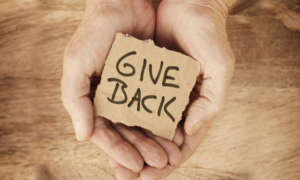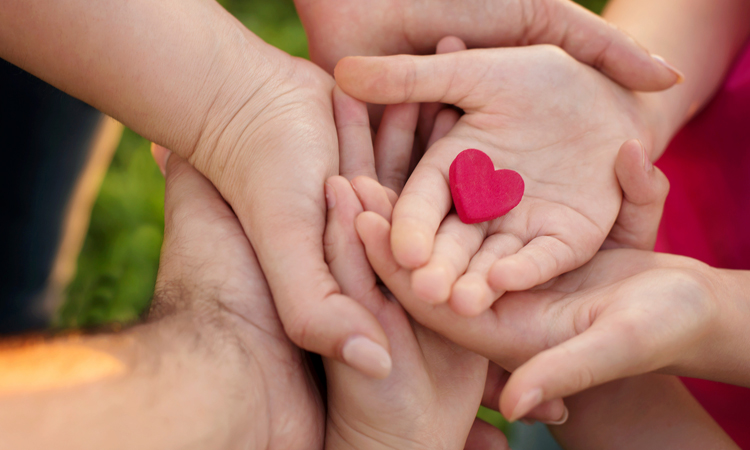“We should make a conscious effort to give back because it benefits both the giver and receiver. To put it simply, we feel good when we’re doing good.”
–Rose Caiola
Hug Therapy For Your Heart
Facebook co-founder and chief executive Mark Zuckerberg and his wife Dr Priscilla Chan, in an open letter to their new daughter Max, have pledged to give away 99 percent of their shares in Facebook – worth about $45 billion today – to good causes over the course of their lifetimes. And they’re not the only ones. Some of the world’s wealthiest individuals have signed a Giving Pledge, a commitment to dedicate the majority of their wealth to philanthropy.
Sure, the uber-wealthy can probably afford to give away the excesses of their fortunes without overthinking it; it’s pretty likely they’ll have plenty left over. But what would the rest of us do with even a little windfall? If we found a crumpled $50 bill on the ground, would we give it to the homeless man on the corner, or use it at that fancy new restaurant we’ve been pining for?
Inner peace and the pursuit of pleasure
 We may find ourselves struggling with how to let go of the green to maximize inner peace and personal happiness. It does feel good to give to those in need, and it can even help us navigate how to get out of a bad mood. Yet, for those of us who weren’t born a Rockefeller, we aren’t without ambivalence when it comes to parting with our money. Take taxes, for instance. While paying them may benefit the social good, many of us gripe and groan when April 15th comes around. Giving, it seems, can be both pleasure and pain.
We may find ourselves struggling with how to let go of the green to maximize inner peace and personal happiness. It does feel good to give to those in need, and it can even help us navigate how to get out of a bad mood. Yet, for those of us who weren’t born a Rockefeller, we aren’t without ambivalence when it comes to parting with our money. Take taxes, for instance. While paying them may benefit the social good, many of us gripe and groan when April 15th comes around. Giving, it seems, can be both pleasure and pain.
“That complicated and ambivalent relationship with giving is just a sign of all the other complicated ways humans pursue pleasure. Pleasure is a central motivator in our lives; after all, if we didn’t find things like food, water, and sex rewarding we would not survive and pass our genetic material to the next generation,” writes David J. Linden, a professor of neuroscience at Johns Hopkins University School of Medicine, in Psychology Today. “Orgasm, learning, highly caloric foods, gambling, prayer, dancing ’till you drop, and playing on the Internet: They all evoke neural signals that converge on a small group of interconnected brain areas called the ‘medial forebrain pleasure circuit’ in which the neurotransmitter dopamine plays a crucial role. It is in these tiny clumps of neurons that human pleasure is felt,” Linden explains.
So when it comes to giving, what gives?
Linden – noting studies conducted by William Harbaugh, a professor of economics at the University of Oregon, and his colleagues who looked at how the brain’s pleasure circuit responded to differing approaches to giving and paying taxes – says: “One theory holds that some individuals give to charity out of altruism. They feel satisfaction from providing a public good, like assistance to the needy, and they care only about how much benefit is offered and not the process by which it occurs. This model implies that these individuals should get some pleasure even when such a transfer of wealth is mandatory, as in taxation.”
That ‘warm glow’
 “A second theory,” Linden adds, “called ‘warm glow,’ holds that people like making their own decision to give. They derive pleasure from the sense of agency, in much the same way that people highly prefer to roll their own dice while playing craps and pick their own lottery numbers. In this model, mandatory taxation is not expected to produce a ‘warm glow.’”
“A second theory,” Linden adds, “called ‘warm glow,’ holds that people like making their own decision to give. They derive pleasure from the sense of agency, in much the same way that people highly prefer to roll their own dice while playing craps and pick their own lottery numbers. In this model, mandatory taxation is not expected to produce a ‘warm glow.’”
Harbaugh’s study recruited nineteen women to perform various economic transactions while having their brains scanned. “They were instructed that no one, not even the experimenters, would know their choices.” Linden adds, “Each subject received $100 in an account, which would then be allocated in various amounts to a local food bank. In some of the trials, the subjects had the option to donate, in others they had no choice–they were ‘taxed.’ In other trials, they received money with no conditions.”
An amount of money appeared to each participant on a video screen – perhaps $15 or $30 – and then they were told the following: “The sum was either a gift to them, an involuntary tax on their account or an offer to donate to charity, which they could either accept or decline by pushing one of two buttons,” Linden explains. “The brain scanning results showed over the entire population that, just like receiving money, both taxation and charitable giving activated nearly overlapping regions of the pleasure circuit. However, on average, charitable giving produced a stronger activation of this pleasure center than did taxation. These results support both ‘pure altruism’ and ‘warm glow’ models as motivators of charitable giving.”
A survival mechanism?
Researcher Lara B. Aknin, of the University of British Columbia, and co-author of the article, Prosocial Spending and Well-Being: Cross-Cultural Evidence for a Psychological Universal, says, “From an evolutionary perspective, the emotional rewards that people experience when they help others may serve as a proximate mechanism that evolved to facilitate prosocial behavior, which may have carried short-term costs but long-term benefits for survival over human evolutionary history.”
And it seems to be the same around the globe, as Aknin’s research team found that “people experience emotional benefits from sharing their financial resources with others not only in countries where such resources are plentiful, but also in impoverished countries where scarcity might seem to limit the possibilities to reap the gains from giving to others.”
Better health benefits, too
 But giving offers more than just emotional benefits, as Elizabeth W. Dunn of the University of British Columbia, and co-authors reveal in an article Prosocial Spending and Happiness: Using Money to Benefit Others Pays Off. A study, which involved students who received $10 and who could donate as much as they wished to other students who didn’t receive any money, finds: “The more money students gave away, the happier their moods afterward…Conversely, the more money students kept for themselves, the more shame they experienced [and] the higher their levels of cortisol, a stress hormone that has been linked to a variety of health problems.”
But giving offers more than just emotional benefits, as Elizabeth W. Dunn of the University of British Columbia, and co-authors reveal in an article Prosocial Spending and Happiness: Using Money to Benefit Others Pays Off. A study, which involved students who received $10 and who could donate as much as they wished to other students who didn’t receive any money, finds: “The more money students gave away, the happier their moods afterward…Conversely, the more money students kept for themselves, the more shame they experienced [and] the higher their levels of cortisol, a stress hormone that has been linked to a variety of health problems.”
On another note, the researchers stated that, “Older adults who report giving more money and other resources to others exhibit better overall health–from fewer sleep disorders to better hearing–even after controlling for a wide range of variables (e.g., gender, income, physical mobility).”
You’ve got to give some to get some
So, while we don’t have to give away the entirety of our small fortunes, it seems that giving can be a gift that gives back. And that’s enough to give anyone a warm glow.



